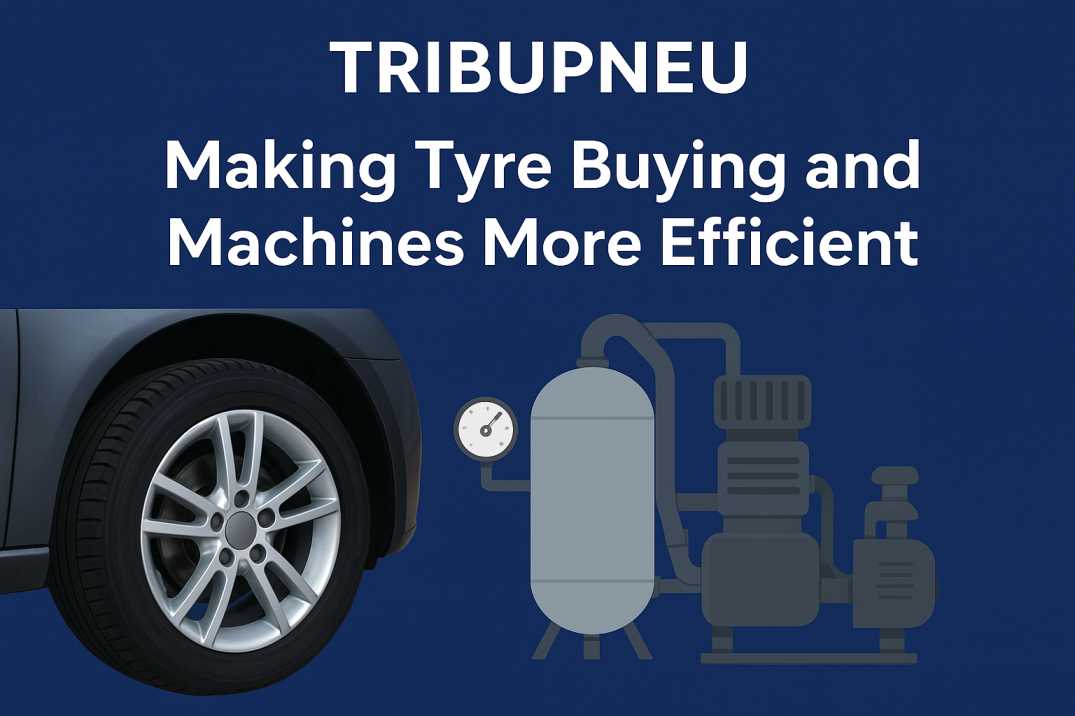Modern life thrives on speed and reliability. Whether it’s a driver searching for safe tyre replacements or a manufacturer striving for smooth production, both share a need for efficiency. Tribupneu brings that idea to life by combining digital convenience in tyre shopping with mechanical innovation in industrial systems.
The concept gained attention for solving two common problems: helping customers buy tyres safely online and helping industries reduce friction in pneumatic machines. It represents a shift toward smarter systems that save time, energy, and money.
Understanding the Concept Behind Tribupneu
Innovation often begins by joining ideas that seem unrelated. Tribupneu blends two scientific fields: tribology (the study of friction and lubrication) and pneumatics (systems powered by compressed air). Together, they create a balanced approach to performance and sustainability.
In France, Copadex, a major tyre distributor, introduced Tribupneu as a digital marketplace where users can choose tyres online, select a nearby garage, and pay after installation. In industrial settings, the same term refers to a method that applies tribology to pneumatic systems, reducing energy waste and wear on components.
| Context | Industry | Purpose | Target Users | Source |
| Automotive | Tyre marketplace | Online selection + local fitting | Car owners, garages | 24presse.com |
| Industrial | Engineering | Friction-reduction + air system efficiency | Engineers, manufacturers | Novelscape.net |
Both meanings share a core value, making processes smoother, safer, and more efficient.
The Automotive Advantage – A Smarter Way to Buy Tyres
The automotive version of Tribupneu reshapes how drivers buy and install tyres. Instead of browsing multiple garages or risking full online payment, customers can complete the process with confidence and transparency.
The platform allows users to:
- Select the correct tyre size.
- Choose a nearby garage from approved partners.
- Have tyres delivered and fitted.
- Pay directly at the garage after service.
This “pay-after-installation” approach reduces hesitation for online buyers while giving garages consistent work. According to 24presse.com, more than 1,500 French garages have joined the network, helping the model earn strong customer trust ratings.
The success of this system shows how digital platforms can improve real-world experiences—offering convenience without losing the human touch.
Industrial Impact – Reducing Friction, Saving Energy
In factories and production lines, machines powered by compressed air face a hidden enemy, friction. Over time, it increases wear, reduces efficiency, and drives up costs. Here, Tribupneu plays a different but equally powerful role.
By applying principles of tribology to pneumatics, engineers can make moving parts glide smoothly, lower air leakage, and extend equipment life. It’s similar to keeping a bicycle chain well-lubricated: the motion becomes effortless, and the parts last longer.
| Performance Metric | Traditional Systems | Tribupneu-Enhanced Systems |
| Friction Loss | 18–20% | Below 8% |
| Equipment Lifespan | 3–5 years | 6–8 years |
| Maintenance Costs | High | Up to 30% lower |
Factories using such improvements report lower downtime and reduced energy use—proof that even small design changes can deliver big savings.
Real-World Applications and Success Stories
The flexibility of Tribupneu makes it relevant to both individuals and industries.
For Drivers: A customer in Lyon can order tyres online, book an installation, and pay locally after seeing the job done. This builds trust and ensures service quality.
For Manufacturers: A plant using pneumatic tools integrates tribology-based designs to lower friction and improve air efficiency. Within months, maintenance costs drop, and productivity increases.
These real examples highlight how this innovation supports smarter, user-focused systems—whether on the road or on the factory floor.
Benefits and Challenges of the Tribupneu Approach
Every innovation brings advantages and a few hurdles.
Benefits:
- Combines online convenience with offline reliability.
- Builds consumer trust through pay-after-service models.
- Extends machinery life and cuts energy waste.
- Promotes eco-friendly practices by reducing material loss.
Challenges:
- Currently limited to the French market for tyre services.
- Industrial systems may require upfront investment.
- Adoption depends on user awareness and training.
| Benefits | Challenges |
| Safer transactions | Limited global reach |
| Longer equipment life | High setup costs |
| Energy savings | Learning curve |
Despite these challenges, its model sets a strong example of practical innovation.
The Road Ahead – Future Potential of Tribupneu
The story of Tribupneu is still unfolding. In the automotive sector, the concept could expand beyond Europe, adapting its pay-after-installation model for regions like Asia and Latin America, where trust-based transactions are popular.
In manufacturing, the combination of tribology and pneumatics could evolve further with smart sensors and real-time monitoring. Technologies like IoT and AI can track friction levels and alert engineers before breakdowns occur.
According to MarketsandMarkets, the global pneumatic equipment industry is projected to grow by nearly 6% annually through 2030, a clear signal that efficiency-driven innovations like this have a promising future.
Conclusion – Bridging Everyday Convenience with Engineering Innovation
Tribupneu stands as a rare idea that connects two very different worlds. For consumers, it simplifies tyre shopping with a safe, flexible process. For industries, it represents a step toward cleaner, smarter, and more efficient operations.
Its real strength lies in its purpose, making systems work better for people and the planet. Whether you are a driver seeking dependable service or a company seeking long-term savings.








